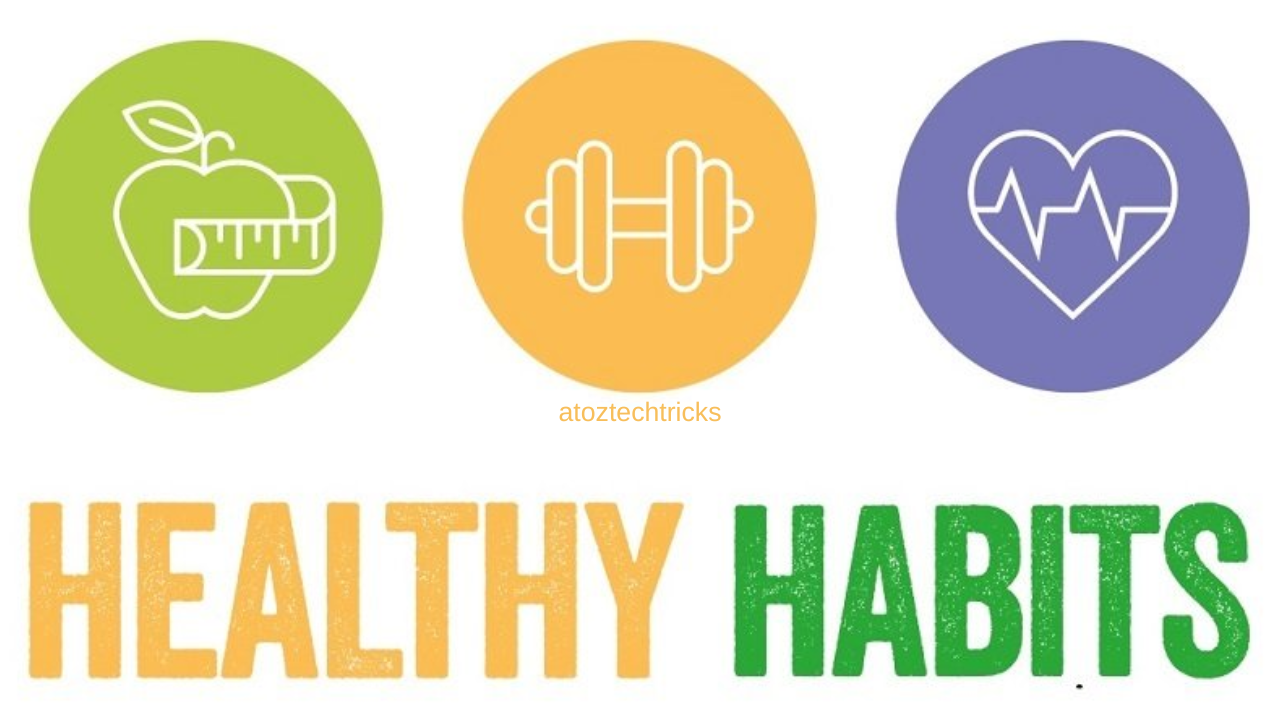Embracing Healthy Habits: A Comprehensive Guide to Wellness
In our fast-paced world, maintaining a healthy lifestyle can often feel like a daunting task. Between work, social obligations, and daily responsibilities, finding time to focus on personal well-being can seem almost impossible. However, integrating healthy habits into your daily routine can significantly enhance your overall quality of life, both physically and mentally. This guide will explore various facets of healthy living, offering practical tips and strategies to help you cultivate a balanced and fulfilling lifestyle.
The Foundation of Healthy Living
1. Balanced Nutrition
a. Understanding Macronutrients
A balanced diet is the cornerstone of good health. Macronutrients, which include carbohydrates, proteins, and fats, each play a critical role in maintaining bodily functions. Carbohydrates provide energy, proteins are essential for muscle repair and growth, and fats support cell function and hormone production. Incorporating a variety of these nutrients in appropriate proportions ensures your body receives the necessary fuel to operate optimally.
b. Emphasizing Whole Foods
Whole foods such as fruits, vegetables, whole grains, lean proteins, and healthy fats should form the basis of your diet. These foods are rich in essential vitamins, minerals, and antioxidants that support overall health. Reducing the intake of processed foods, which often contain unhealthy fats, sugars, and additives, can help prevent chronic diseases and promote better well-being.
c. Hydration
Water is fundamental to maintaining good health. It aids in digestion, regulates body temperature, and supports cellular functions. Aim to drink at least 8 cups of water daily, and adjust based on activity levels and climate. Herbal teas and water-rich foods like fruits and vegetables can also contribute to your daily hydration needs.
Physical Activity: Moving Towards Better Health
2. Regular Exercise
a. Benefits of Cardiovascular Exercise
Cardiovascular exercises, such as running, swimming, and cycling, are crucial for heart health. These activities increase your heart rate, improving circulation and reducing the risk of heart disease. Regular cardio workouts also help manage weight, boost energy levels, and enhance mood by releasing endorphins.
b. Strength Training
Incorporating strength training into your fitness routine is essential for building and maintaining muscle mass. Weight lifting, resistance bands, and bodyweight exercises can improve muscle strength, bone density, and metabolic rate. Aim to include strength training exercises at least twice a week for optimal results.
c. Flexibility and Balance
Flexibility and balance exercises, such as yoga and stretching, are important for overall fitness. These activities enhance joint mobility, reduce the risk of injury, and improve posture. Incorporating these exercises into your routine can lead to a more balanced and injury-free lifestyle.
Mental and Emotional Well-being
3. Stress Management
a. Identifying Stress Triggers
Stress is a common aspect of modern life, but managing it effectively is crucial for maintaining mental health. Identifying your stress triggers, whether they are work-related, personal, or environmental, can help you develop strategies to address them. Techniques such as mindfulness, meditation, and deep breathing exercises can be effective in reducing stress and promoting relaxation.
b. The Importance of Leisure Activities
Engaging in leisure activities and hobbies is an excellent way to relieve stress and improve your overall mood. Whether it’s reading, painting, gardening, or playing a musical instrument, dedicating time to activities you enjoy can provide a mental break and enhance your sense of well-being.
c. Seeking Professional Help
If you find that stress or emotional issues are becoming overwhelming, seeking professional help is a proactive step. Therapists and counsellors can provide support and strategies to help manage mental health challenges effectively. It’s important to recognize that seeking help is a sign of strength, not weakness.

Sleep: The Unsung Hero of Health
4. Quality Sleep
a. The Importance of a Sleep Routine
Quality sleep is essential for overall health and well-being. Establishing a consistent sleep routine can help regulate your body’s internal clock, making it easier to fall asleep and wake up feeling refreshed. Aim for 7-9 hours of sleep per night and try to go to bed and wake up at the same time each day, even on weekends.
b. Creating a Sleep-Friendly Environment
Your sleep environment plays a significant role in the quality of your rest. Keep your bedroom cool, dark, and quiet to create an ideal sleeping environment. Investing in a comfortable mattress and pillows can also improve sleep quality. Avoid screens and stimulating activities before bedtime to help your mind wind down.
c. Addressing Sleep Disorders
If you experience persistent sleep issues such as insomnia or sleep apnea, it’s important to address them with a healthcare professional. Sleep disorders can have a significant impact on your overall health, and proper diagnosis and treatment are crucial for improving sleep quality.
Building Positive Relationships
5. Social Connections
a. The Impact of Social Support
Building and maintaining positive relationships is crucial for emotional health. Social support from friends, family, and community can provide a sense of belonging, reduce feelings of loneliness, and offer emotional support during challenging times. Make an effort to nurture these connections and seek out social opportunities that align with your interests.
b. Effective Communication
Effective communication is key to fostering healthy relationships. Practice active listening, express yourself openly and honestly, and address conflicts with empathy and understanding. Strong communication skills can help resolve misunderstandings and strengthen your connections with others.
c. Setting Boundaries
Setting healthy boundaries is an important aspect of maintaining balanced relationships. It’s essential to establish limits that protect your time and well-being while respecting the needs and boundaries of others. Clear boundaries help prevent burnout and ensure that your relationships remain positive and supportive.
Personal Development and Growth
6. Continuous Learning
a. Pursuing New Skills
Engaging in continuous learning and personal development can enhance your self-esteem and open new opportunities. Whether it’s taking up a new hobby, enrolling in a course, or reading about a topic of interest, expanding your knowledge and skills contributes to personal growth and fulfilment.
b. Setting Goals
Setting achievable goals is a powerful way to stay motivated and focused. Establish both short-term and long-term goals that align with your values and aspirations. Break them down into manageable steps and track your progress regularly. Celebrating your achievements, no matter how small, can boost your confidence and drive.
c. Embracing Challenges
Embracing challenges and stepping out of your comfort zone can lead to significant personal growth. Facing new experiences and overcoming obstacles builds resilience and adaptability. View challenges as opportunities for learning and growth rather than as threats to your well-being.

Environmental and Lifestyle Factors
7. Creating a Healthy Home Environment
a. Reducing Toxins
A healthy home environment is essential for overall well-being. Reduce exposure to household toxins by choosing natural cleaning products, avoiding excessive use of pesticides, and ensuring proper ventilation. Keeping your living space clean and clutter-free can also contribute to a more peaceful and healthful environment.
b. Incorporating Nature
Spending time in nature has been shown to reduce stress and improve mental health. Incorporate natural elements into your living space by adding houseplants, creating a garden, or spending time outdoors. Nature can provide a calming effect and enhance your connection to the environment.
c. Ergonomics and Safety
Creating an ergonomic workspace can prevent physical strain and improve productivity. Invest in a comfortable chair, desk, and proper lighting to support good posture and reduce the risk of musculoskeletal issues. Additionally, ensure that your home is free from safety hazards to prevent accidents and injuries.

Financial Health and Stability
8. Managing Finances
a. Budgeting and Saving
Financial stability is a crucial aspect of overall well-being. Create a budget to track your income and expenses, and develop a savings plan to build an emergency fund. Regularly review your financial goals and adjust your budget as needed to ensure that you’re on track to achieve your financial objectives.
b. Investing for the Future
Investing wisely can help secure your financial future and provide peace of mind. Explore different investment options, such as stocks, bonds, and retirement accounts, and seek professional advice if needed. Diversifying your investments and staying informed about market trends can help you make informed financial decisions.
c. Managing Debt
Effectively managing debt is essential for maintaining financial health. Develop a plan to pay off high-interest debt and avoid accumulating new debt. Consider strategies such as consolidating loans or negotiating with creditors to reduce interest rates and manage repayments more effectively.
Integrating Healthy Habits into Your Daily Life
9. Creating a Routine
a. Establishing Daily Habits
Incorporating healthy habits into your daily routine can make them feel more natural and less burdensome. Start by setting small, achievable goals and gradually build on them. Consistency is key, so aim to make these habits a regular part of your life rather than sporadic efforts.
b. Staying Motivated
Staying motivated can be challenging, but finding ways to keep yourself inspired can help. Set reminders of your goals, track your progress and reward yourself for achieving milestones. Surround yourself with supportive individuals who encourage and celebrate your efforts.
c. Adapting to Change
Life is constantly evolving, and it’s important to adapt your healthy habits to fit your changing circumstances. Be flexible and open to modifying your routine as needed. Whether it’s adjusting your workout schedule or finding new ways to manage stress, embracing change can help you maintain a balanced and healthy lifestyle.
Incorporating healthy habits into your life is a powerful way to enhance your well-being and improve your quality of life. By focusing on balanced nutrition, regular exercise, mental and emotional health, quality sleep, positive relationships, personal development, and environmental factors, you can create a holistic approach to wellness. Remember that achieving and maintaining good health is a journey, not a destination. Start with small, manageable changes and build on them over time to create a sustainable and fulfilling lifestyle. Embrace the process, stay motivated, and celebrate your progress along the way.





Post Comment